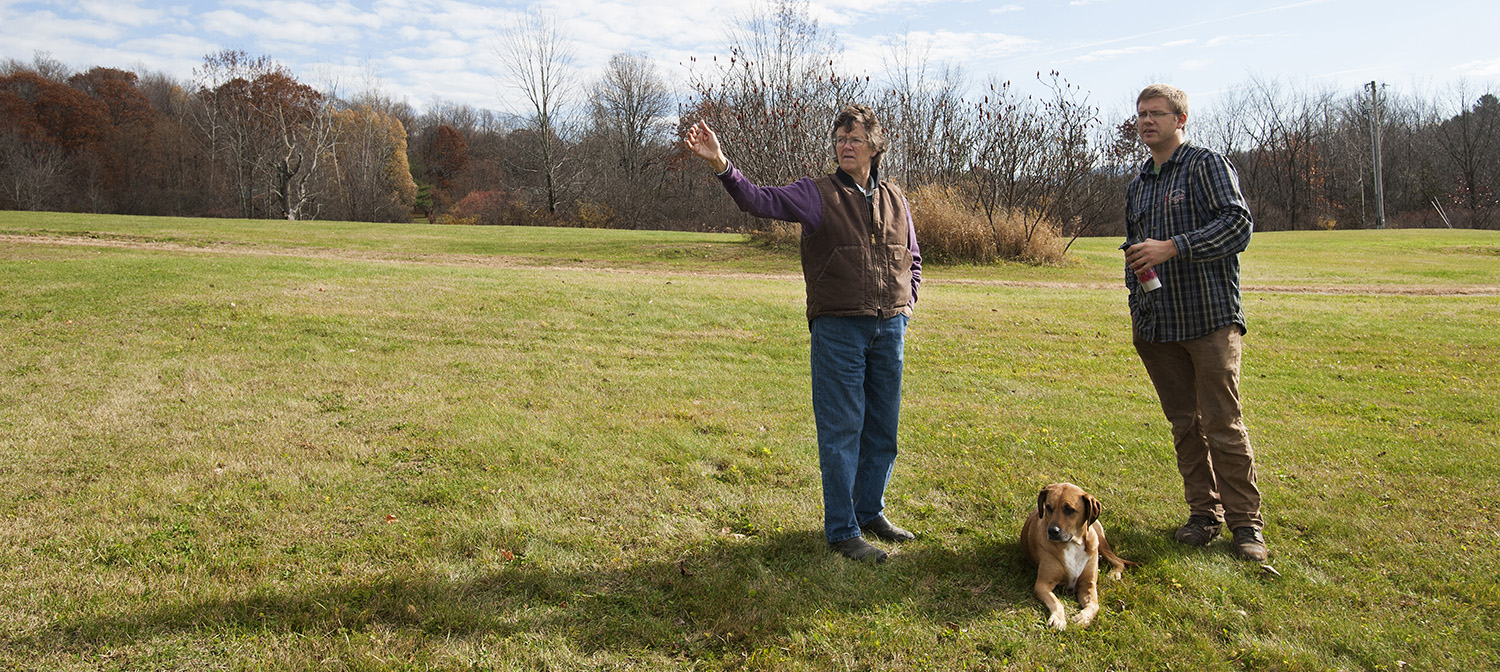by Lynn Monty
SunCommon of Waterbury Center will build a one-acre solar array on Hinesburg resident Marilyn Brown’s property at 534 Fletcher Farm Road. The Hinesburg Planning Commission reviewed the project on Nov. 25 and voted 6-0 in support of the array that will serve about 30 Vermont households.
“We feel the size and scale of the proposed renewable energy facility is in keeping with both Hinesburg’s Town Plan and land use regulations,” said Joe Iadanza, Chairperson of the Hinesburg Planning Commission.
Iadanza said the location at the end of Fletcher Farm Road is well suited for the installation because it will have no adverse impact on significant scenic views or vistas from public roads, community parks and public trails.
The solar array avoids sensitive natural features on the property in question, including a mapped stream and wetlands, Iadanza said. It is also aligned with many of the town’s energy and business development goals.
“I think it is important to generate more of our electricity in a renewable way,” said James Donegan of the Hinesburg Planning Commission.
Nationwide, only about 15 percent of households can host rooftop solar arrays. As a result, according to GTM Research’s 2015 US Solar Market Insight Report, “Out of a total of over 100 million households in the US, more than 80 million are left out of the solar market today.”
SunCommon developed the Community Solar Array Program as a way of addressing that shortfall in Vermont. The Community Solar Array Program launched one year ago and serves more than 500 Vermont households. Green Mountain Power customers join the program to receive credits produced by the group array to reduce or eliminate their utility bill. Solar credits are recognized on a customer’s utility bill at a 7 percent discount from their normal rate for electricity. For every $100 they would normally spend, they’ll now spend $93 for the same power as part of the array.
“It was a huge discovery we made last year,” said SunCommon spokeswoman Emily McManamy. “Many of our customers couldn’t go solar with us for a whole host of reasons from wrong roof orientation, tree shading, finances or lack of tax appetite. Some folks just don’t want rooftop solar on their own homes, but want to support the growth of solar arrays in Vermont.”
Community solar member Bruce Baldwin of Middlebury said he and his wife joined the Monkton community solar array in March with a 7 percent share.
“We immediately began seeing benefits,” he said. “Our CSA share generates enough credits to cover our electric bills over the summer, pay for our two heat pumps and take us into the winter with a $726 credit on our electric bill. We’re saving money and reducing the amount of oil we burn helping to make our little corner of the world just a bit greener.”
But Attorney General Bill Sorrell said most community solar projects cannot be sold as solar, renewable or clean because solar companies sell the renewable energy credits attributed to the electricity generated by the solar panels in a regional market in order to help finance the project. “In such cases, the energy used by the consumer is not, legally speaking, renewable or solar energy, it is simply undifferentiated power,” he said in a Dec. 8 press release.
SunCommon co-founder Duane Peterson said in response to the unfolding climate crisis, sound public policy created renewable energy credits that have driven the installation of a lot of solar arrays throughout New England.
“It’s great when utilities are required to put money into building clean energy facilities,” he said. “Renewable energy credits have helped SunCommon bring community solar to 500 Vermonters, providing CSA members the opportunity to help generate renewable energy while saving money on their power bills. SunCommon is committed to making clear to our customers how all this works, as we continue this innovative program which makes it possible for all Vermonters to help generate renewable energy.”
Many community solar purveyors require customers to purchase the panels, which are installed on someone else’s property, Peterson said. SunCommon rejected that model because it is challenging for customers when they move. “Our CSA members pay monthly for shares with the ability to leave anytime through a cancellation fee,” he said. “That’s proved popular, and part of why SunCommon has built 20 CSAs while others limited themselves to just a few.”
Act 56, signed into law by Governor Shumlin in June, requires Vermont utilities to meet a renewable energy standard similar to those in place in other New England states. As renewable energy requirements of this law increase over time, the sale of renewable energy credits into the regional market for projects in Vermont are expected to diminish, said Christopher Recchia, Department of Public Service commissioner.
Solar projects are a vital component of Vermont’s renewable energy goals, and it is incumbent on solar companies to communicate clearly with customers about the terms and benefits of their contracts,” Recchia said.
Hinesburg solar credits will be sold this year, Peterson said. “With Vermont policy to change next year, we’ll see what happens to them thereafter.”
Check out the story in the Shelburne News!





